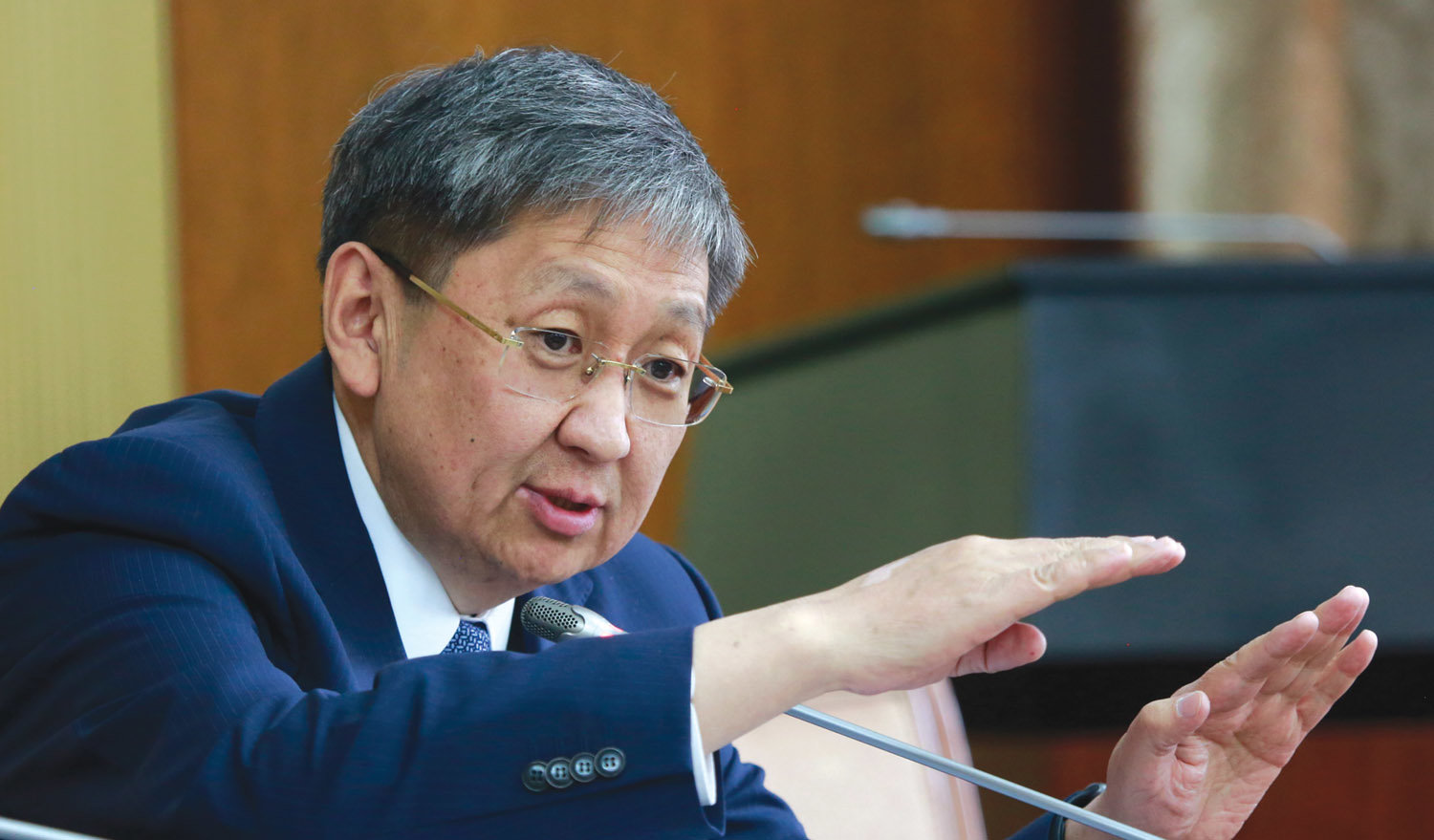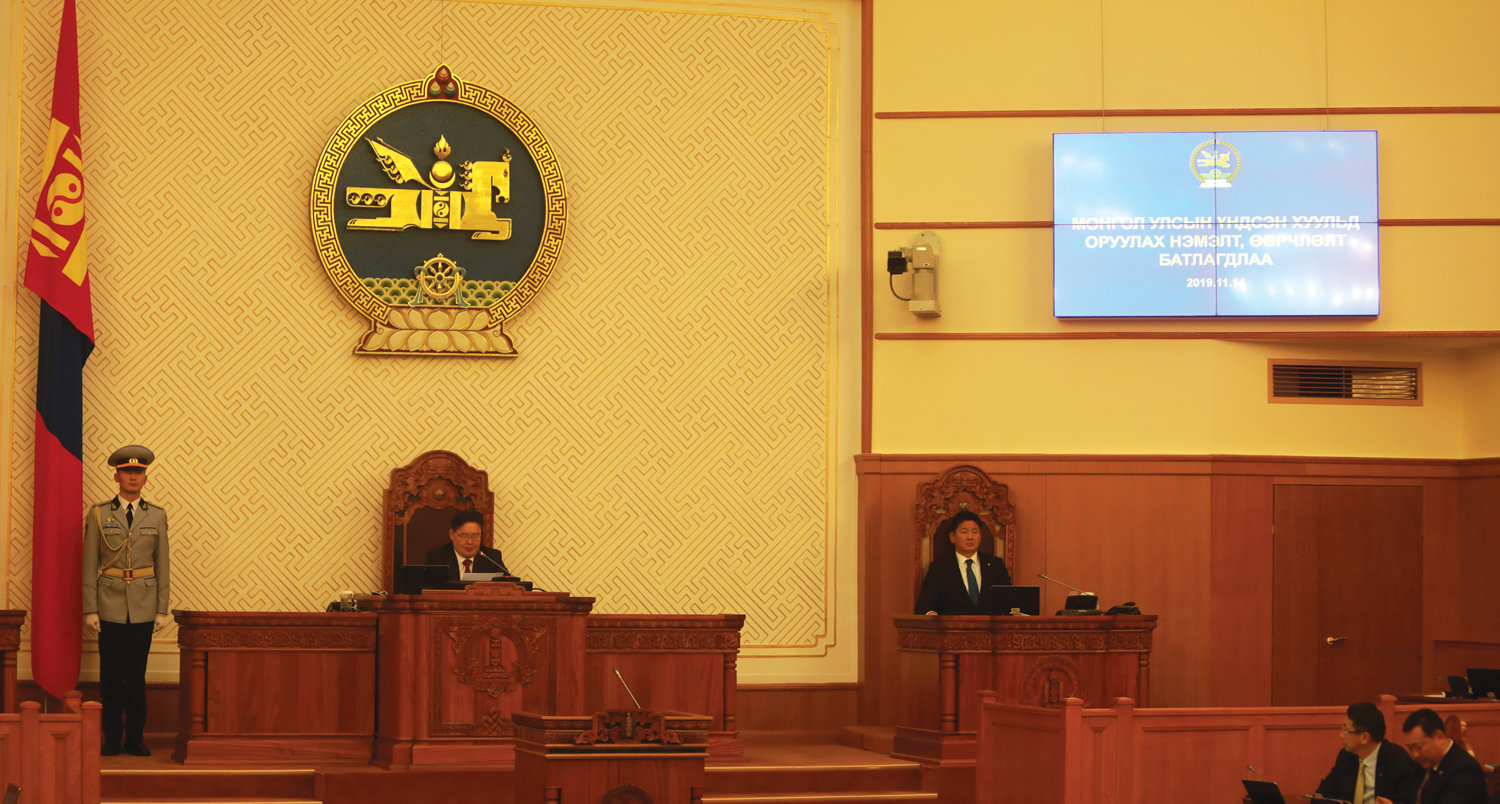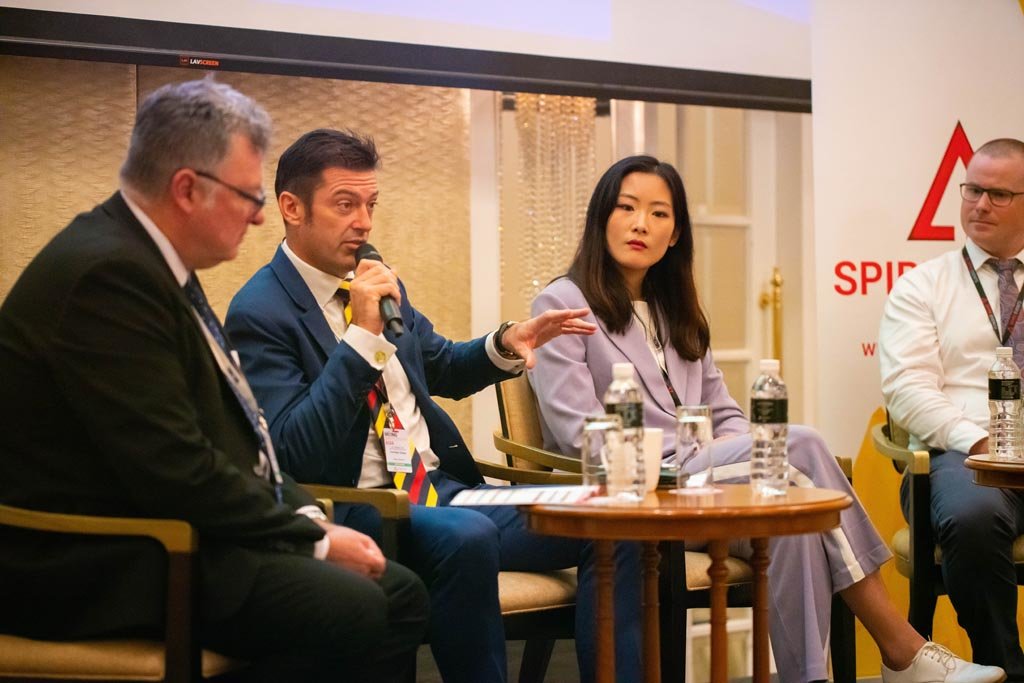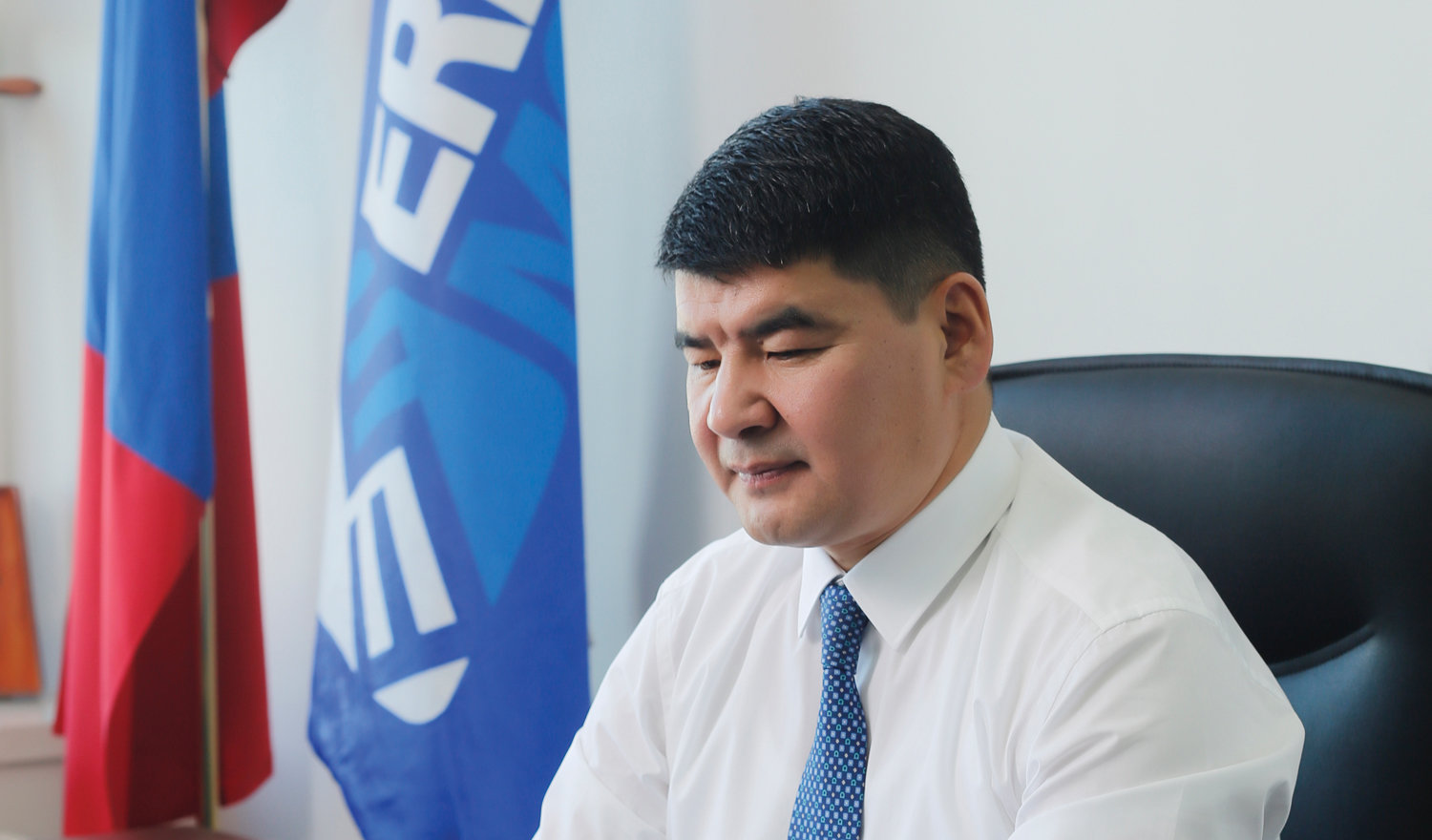Recent news
Royalties removed, revived
When all royalties-related regulations in the Mineral Law were struck down mainly on a technical ground by the Constitutional Court on 30 October, the Finance Minister was in a fix as he did not know what impact this would have on his budgets for this year and the next. The Government was losing MNT4.6 billion per day from the day of the court order, directly affecting budget revenue this year, and making it uncertain where the projected income of MNT1.3 trillion from royalties in the 2020 budget would come from. A revised set of regulations, correcting the procedural lapse, could be put in place only on 22 November, and since they are to be applied with retrospective effect, the Minister must be smiling again.
“Challenges are more opportunity than problem”
Ben Chalmers, Senior Vice President of The Mining Association of Canada, was in Mongolia in September to spread awareness about the concept of TSM or Towards Sustainable Mining. B. Tugsbilegt finds out from him more about TSM, and how it would help mining meet stricter standards of emission reduction, water management and such environmental challenges.
Reducing greenhouse gas emission is not yet a priority area of concern for Mongolian miners but this will surely change as the world gears for climate change. What are the things to which they should pay special attention?
There can be no doubt that mining should pay attention to climate change. One way we can do this is to use a system like TSM to manage our energy usage effectively and to set emissions targets.
Amendments lead to responsibility
The future will remember 14 November, 2019 as a momentous day in the history of post-transition Mongolia when the 64 members present in parliament unanimously voted for the first substantive changes to the Constitution since its adoption 20 years ago, thus concluding five months of public debate on ushering in a new era in public affairs.
The opposition, with a strength of 12 in the 76-member House, stayed away from the voting, but several of the amendments adopted had been proposed by it and the public perception of the overall amendment exercise is that it has been an act of national consensus. Nobody knows what the future holds, but for the moment, people are relieved that a prolonged period of uncertainty is over and that the important reforms would allow a government to “function in a more orderly manner”, in the words of the Speaker of Parliament.
“No exploration licence without prior local approval”
S. Purevsuren, a journalist with The Dundgoviin Amidral, talks to O. Bat-Erdene, Governor of Dundgovi aimag, on the current mining situation there, and how mining is benefiting the local community.
Could you give us some current data on mining in Dundgovi aimag?
When the year began, there were altogether 213 licences registered, covering 783,000 hectares or 10.5 percent of the total territory of the aimag. Of these, 98 were for extraction, spread over 13 soums, and 115 for exploration, spread over 15 soums.
Of the 98 extraction licences, 30 are for fluorspar, 24 for coal in 7 deposits, 17 for gypsum in 3 deposits, 5 for construction materials, 7 for iron-zinc, 5 for gold, 2 for limestone and one each for nonferrous metal, graphite, lithium, and perlite. These are held by 74 entities, 40 of them domestically owned, 17 foreign and Mongolian joint ventures, and another 17 fully foreign invested.
“It is everybody’s silence that is making the situation worse and worse”
B. Ulziibayar, Chairman of the Board of Directors of the Mongolian Association of Securities Dealers (MASD), answers questions from MMJ on Mongolia’s current economic situation, investment environment, future of the mining sector, the stock market, and other issues.
How do you see the current economic situation?
Mongolia is not a rich country. We are a market economy and the demand for money being more than its supply, bank interest rates are high here. The demand can be met if money is poured into the economy, in the form of, say, loans and public funding. Receiving foreign investment also supports the economy in this.
A matter of ownership
Trained as a non-ferrous metal engineer and later earning a law degree, N. Algaa was first Executive Director and then President of the Mongolian National Mining Association, before joining Dat Consulting LLC as Executive Director. The Mongolian Mining Journal has interviewed him on several occasions, and we are happy that he will be writing a series of articles for us giving his analysis of and views on developments in the minerals sector. This is the first one and was written in August.
The 2020 budget: Spending splurge but are we sure we have the money?
Taking full advantage of the surge in mineral exports, the ruling Mongolian People’s Party has prepared the 2020 budget as a typical election year exercise, hoping to impress voters by generous public expenditure. No one should be surprised that all IMF warnings not to give in to electoral compulsions and pleadings to stick to a tight fiscal policy and improve fiscal discipline have been ignored. The Finance Minister may well say that the budget shows a rise in revenue also and even if he spends more, at 5.1% of GDP the estimated deficit is still within acceptable limits.
New ‘Coal in Asia’ segment to be launched at the 6th Mining Investment Asia
Coal is a dominant fuel in the rapidly growing economies of South East Asia even amidst a global move towards clean energy. Within the Asian region, India, China and Indonesia play major roles both as consumers and producers of coal. Hence, ‘Coal in Asia’ seeks to focus on what lies ahead for coal in the region and the key drivers for transformation. Major national and private coal mining companies are confirming their participation, with key stakeholders such as Indonesia Coal Mining Association (APBI-ICMA) already supporting this event.
What was said at Discover Mongolia 2019
We give below some salient points in the speeches and presentations at the last Discover Mongolia, as compiled by E.Odjargal at the 17th session of the annual international conference, intended to spread information and awareness about Mongolian mining and attract foreign investment.
G.Nandinjargal, State Secretary in the Ministry of Mining and Heavy Industry, who formally opened the event:
“The Government of Mongolia is working on creating a friendly, open and transparent legal environment for investors, ensuring economic stability and creating a system that would protect business interests. Despite the need to diversify the economy, mining will undoubtedly continue to be Mongolia’s leading industry in the next 20 to 30 years. At present, data is available on mineral resources in 20% of the total territory of Mongolia.
Redpath uses its global experience to meet OT Underground challenge
Redpath Mongolia is celebrating the completion of 15 years of presence in Mongolia. Its biggest responsibility here has been the lateral development of the Oyu Tolgoi underground mine, and Scott Hayne, Executive Director, tells MMJ about the challenges that have cropped up and how he is confident that the company’s wide experience will lead it to success, with the help of a skilled and motivated Mongolian workforce.
Your company is well known in the global mining industry. How important are your Oyu Tolgoi operations in terms of your total responsibilities? What are some other global projects that you now have?
Redpath is currently involved with over 90 projects globally, spanning 13 countries. Our employee base in Mongolia accounts for just over 15% of Redpath’s workforce worldwide.
Being on the grey list is a red signal to the economy
As if we do not already have enough economic worries, comes the announcement on 18 October that The Financial Action Task Force (FATF) has identified Mongolia as a “jurisdiction with strategic AML/CFT (anti-money laundering/combating the financing of terrorism) deficiencies”, a move that is commonly called grey listing. FATF is an intergovernmental organization to develop policies to combat money laundering and terrorism financing.
Being on the grey list is not as bad as being blacklisted; the two can be compared to being shown a yellow card and a red card respectively in a football match, and FATF did say Mongolia has already developed an action plan to address the most serious deficiencies and has shown high-level political commitment to it. But until we come off the list, it has the potential to pose serious challenges to our economic growth.
“2021 would see significant expansion and diversification in the activities of Erdenes Mongol”
P. Gankhuu, CEO of Erdenes Mongol, tells G. Iderkhangai why it is right to keep the company directly under the Prime Minister and how the proposed mineral wealth fund, managed on purely professional principles, will work for the benefit of all Mongolian citizens.
How do you see the future of projects which are joint ventures between the Government and the private sector?
Erdenes Shivee Energy and Beren Group have established a joint venture company called Erdenes Steel in Dornogobi aimag, with the two sides owning equal share. The Development Bank is the financial guarantor for Erdenes Shivee Energy in the project, which plans to annually produce 300,000 tonnes of cast iron.
Turning the Development Bank into a bank for development
E.Odjargal talks to G.Amartuvshin of Development Bank of Mongolia, and finds that only months after taking over as Executive Director, he is putting in place big changes and envisions radically different ways for the institution to work more professionally, free of political control.
What are your priorities at DBM?
There are three.
First, to improve the internal organization and governance practices. Regulations and lending procedures have been streamlined. DBM used to be criticized for delay in acting on loan requests from companies and, often enough, these could not even be traced. Now the entire process has been made more transparent. Second, the credit quality. Six cases of unpaid loans have been transferred to the prosecutor.
“Arkhangai will survive and prosper without mining”
Arkhangai wants to be an aimag without any fresh mining. Kh. Tsevegmid, a reporter with The Arkhangai Mirror, asks its Governor, Ts. Monkhnasan, about the decision and how it is being implemented, and about the present mining situation, especially as relates to reclamation, there.
What is the policy of the aimag on mining?
Both the local parliament and I myself have taken the policy that Arkhangai must develop without any fresh mining. The initial impetus came in 2015 with the amendment to the long-named law, and we intend to keep more mining out as we try our best to quickly make use of the other opportunities for our aimag to develop, such as by promoting tourism, animal husbandry and industry.
Discover Mongolia-2019
Discover Mongolia-2019
Minerals and Mining Business Summit. September 27, 2019 Shangri La Hotel, Ulaanbaatar, Mongolia
9th Coal Mongolia 2019
9th Coal Mongolia 2019
International Coal Trade, Investment Conference and Exhibition, September 5-6th, 2019, Ulaanbaatar
The troika that runs Mongolia
B.Tugsbilegt
The President, Parliament, and the Prime Minister – these are three highest powers that run our country. Unfortunately, the troika do not always take their steps in unison, as, say, is seen from the way each wishes to leave their own mark on the mining sector, which is the mainstay of the national economy, and could do with some coordinated support. The referendum will show whether the people want our natural resources as something like the state’s public property. Similarly we could have a “state’s public plan” for the mining sector, if only the three supreme centres of state power agreed on what to do. Elections are not far away and like all governments wishing to hold on to power, our present one under U.Khurelsukh has started showing off how brave, decisive and determined it can be. What the Prime Minister did on 13 August would surely win him the “Year’s shock worker” award, if there was one.
“The priority is faster and easier border crossing for our coal”
J. Zoljargal, CEO of Mongolian Coal Association, is not too enthusiastic about expensive infrastructure development projects as, to him, what exporters need most is better facilities to take their coal to the buyer in China faster and freely. In a wide-ranging conversation he tells B.Tugsbilegt that coal prices would not always stay high, but in a positive development Chinese state policy is bringing buyers geographically closer to Mongolian coal mines.
What is the current coal export situation?
Export volume in the first half of the year was 1.5 percent less YoY, down from 19 million tonnes in 2018 to 18.6 million tonnes, but this is a marginal drop and our goal for the full year is to achieve 42 million tonnes.
Move to make major changes in Constitution
In keeping with the hot days of summer, Mongolians are carrying out a heated debate on amending the Constitution, though their mood is frequently not as sunny as it is outside. The Parliamentary Office has been collecting people’s opinions and views since June 25. Members of parliament have been touring in their electoral districts, sampling popular response to the bill which, if approved, would give us a significantly altered Constitution on July 1, 2020, as promised in the Action Plan of the Mongolian People’s Party, which has majority in the present Parliament.
This is not the first time the Constitution has been sought to be amended in a major way, though all such efforts have failed up to now, for various reasons. The Constitution was adopted in 1992, to help establish a humane, democratic, fair and compassionate society and, more importantly, to encourage an independent political system in the country which had just recently decided to abandon the Soviet model.
Miners pledge to be responsible
Major companies in the extractive industry in Mongolia recently came together to launch a campaign to encourage the practice of responsible mining. Among those who attended the meeting at Tuushin Hotel were those representing Oyu Tolgoi, Erdenet Mining, Energy Resources, Aspire Mining, SouthGobi Sands, Terra Energy and Baganuur. Later, they all joined the Responsible Mining Voluntary Code.
The campaign was initiated by the Mongolian National Mining Association (MNMA) and is to be implemented together with the Ministry of Mining and Heavy Industry. Those who joined the codex and signed a memorandum of understanding (MoU) included Kh. Badamsuren, Director General of the state-owned Erdenet Mining Corporation, Armando Torres, CEO of Oyu Tolgoi, G. Battsengel, CEO of Energy Resources, Z.Gan-Ochir of Aspire Mining, Ch. Munkhbat, President and CEO of SouthGobi Sands, Sam Bowles, CEO of Terra Energy, and O.Tuya, Vice Director of Baganuur JSC. The MoU has 30 clauses in 5 sections.



















